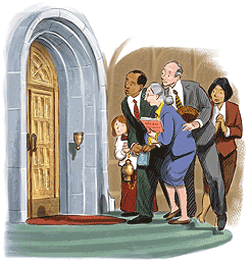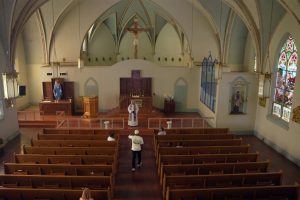A new pastor's offers suggestions for those preparing the parish welcome wagon.
"You must be Father Darren. You're our new pastor!" Those were the first words uttered by a couple I had never seen in my life. They excitedly approached me with smiles, wide bug eyes, and extended hands.
My shock was magnified by the fact that this couple, the Somers, ran into me nearly 600 miles and five dioceses from home! We met at St. Josaphat Church in Chicago, where I was helping with sacramental work on weekends. I was finishing studies at the time, about a month away from becoming pastor in a small city in Kansas. I had put a notice in the St. Josaphat bulletin to inform the parish I had been named pastor in Emporia, Kansas. The Somers, it turned out, were Emporians who had come to St. Josaphat to attend the Baptism of their new grandbaby.
Now, Chicago is large. It boasts of having almost 400 parishes. The likelihood of the Somers running into their soon-to-be pastor is about as great as finding the proverbial needle in a haystack. We laughed in awe and amazement.
The following week, while I was still in Chicago, half of Emporia already knew something about their new pastor. Meeting the Somers ended up being a grace-filled encounter that helped break the ice between an incoming pastor and parishioners.
I was fortunate. The Somers were like God-sent emissaries to give me a point of contact with God's people in Emporia. Yet this strange scenario, which won't likely be repeated anytime soon, shows the interesting dynamic priests often experience when arriving at a new parish: The parishioners know the priest, but the reverse does not always come as quickly. The parishioners have one person to get to know-the pastor. The pastor, however, has thousands.
It can be intimidating, and I have often felt embarrassed when I fail to remember a name or where I met a person. So I offer these five ways for parishioners to help acclimate a new pastor.
What's in a name?
Names are significant. The first question asked when we were presented to the church for Baptism was, "What name have you given this child?" As a pastor, I want to be able to call individuals by name. With a few thousand parishioners, though, I find name reminders to be necessary. I tell people that if I am unable to call them by name, there is a reason: I do not know it. I encourage parishioners to tell me their names, and it might take multiple times. Some people are aural learners and pick up information just by hearing something stated once. Others are visual learners and might need to see a name in writing. I fall into this latter category.
It is challenging to learn names as people whisk by after Mass, giving a three-second handshake. For me it's nearly impossible, not because I don't care, but because there are simply too many names to remember all at once.
It's helpful when someone has an unusual trick to remember his or her name. For example, I learned Terry Truesendorf's name when he quizzed me every single week until I got it right. He would drop hints, such as, "It's not a ‘false' name."
Another helpful practice is when a parishioner shares her profession. Telling information about one's life helps the priest to fill in the empty space. Instead of just seeing a familiar face, having information such as a personal attribute, one's occupation, or other interesting fact, can provide a mental hook on which to hang a person's name.
Alerting the priest to some small self-revealing fact can also be helpful in building community and cultivating effective parish stewardship. Providing name reminders and cues for quick recall will likely need to be extended well beyond the first few months. Much depends on the size of the parish. Larger parishes need to be more patient. Some parishes designate one month a year when parishioners are invited to make name tags before each Mass so that priests, ministers, and people sitting next to one another in the pews can learn names.
You are invited
One effective way to see people in their element and to learn about one another is in small groups. In any given month numerous standing committees or parish organizations meet. Priests often receive open invitations. The leader of the men's softball team might say, "Hey, Father, stop by for practice sometime!" The offer is genuine, but the missing element of open invitations is a commitment. Maybe the priest is not sure where the practice takes place. He might be unfamiliar with the city or neighborhood, still learning his way around.
The "stop by" approach is non-threatening, flexible, and open-ended. Yet the danger is that follow-through might not take place. Instead, invite the priest to a specific function. For example, a fourth-grade teacher wanted me to come to her classroom to talk about saints. She invited me to come anytime during the month of November and said her class usually had religion at 11:15. Her offer was specific and purposeful yet allowed for flexibility.
This situation was very helpful because a pastor wants to share himself and find out about groups and classes at the parish without giving the impression that he is "checking up" on folks. As a new pastor, I worry that an unannounced visit to a religious education or school classroom can surprise the catechist. The teacher's invitation dispelled my hesitation. Our visit made me feel more at ease with the school and with the students.
In another example, a member of the men's spirituality group offered to meet me after daily Mass. I joined the group for their monthly breakfast gathering. In these smaller settings, the pastor has the opportunity to ask questions, to learn people's names, and to spend quality time building relationships. The same is true for the parishioners. The men's group had the chance to see a more personal side of me, something that cannot always be shared in the moments after Mass.
History lesson
In a spirit of charity and openness, engage the new pastor and share with him the traditions of the parish. Why does this parish keep a candle lit alongside the statues of St. Francis and St. Anthony? Why is there an African-print chasuble in the closet? Who was Father Renyer for whom the reception hall is named?
The particularities of the parish, the liturgical customs, and even the office procedures are important parts of parish life. Don't assume that the new pastor knows that "This is the way we've always done it!" Guaranteed, he has not always done it in the same way. There needs to be sharing of tradition and lived practices. Yet both parties-parishioners and priests-need to work out the delicate dance of give and take for a successful relationship.
I find it helpful when I understand the reason behind a certain practice. For example, one parish always recited a communal prayer just before the entrance procession at Sunday liturgies. Sometimes the prayer was for the particular season, while other times it focused on stewardship. I later found out it began some years back when the parish had its first major building project in some years. They used the prayer to unite the parish in this endeavor.
In another situation a parish always had a three-hour gap between Christmas Eve Masses. I discovered this schedule had been set up many pastors ago to allow parishioners time to visit a nearby mission that the parish no longer served. Knowing the schedule did not reflect the current parish reality opened the opportunity for evaluating Mass times.
Engaging one another is a two-way street. The parish educates the priest. The priest educates the parish.
A new pastor brings new ideas. I find it exciting to expose parishioners to things I have learned or seen at other parishes. I look for appropriate ways to share new visions. At the same time, I worry that my enthusiasm might eclipse the history and the lived experience of the parish. Balancing between the current parish identity and fostering helpful change is key. This will happen when parishioners engage the pastor and he learns the parish history and dynamics.
Constructive criticism
A wise, retired priest taught me that feedback is simply new information and should not be designated as negative or positive. When we remove the labels of value, feedback becomes an important tool for sharing our lives and ultimately for building up our parishes and God's reign.
Feedback is important to a new pastor. A priest needs to hear what is disliked. When sharing criticism, one should be compassionate but honest. If he does not know what folks are saying or feeling, he is denied the opportunity for growth and change. Avoid rumors and hearsay, but constructive feedback and one's perspective on parish issues are important.
Many times a priest may be unaware that a particular practice or decision of his has been poorly received. In the first parish I served, I did not develop the habit of verbalizing the daily Mass intention. When I moved to a new parish, a daily Massgoer asked me why I neglected to mention the name of the deceased for the Mass intention. I had hardly thought about it, not because I didn't care but because of previous habit.
These situations provide the opportunity for dialogue. As a pastor, I sometimes feel like I'm in the dark. It sounds strange, but until a pastor gets two feet firmly on the ground, feedback and guidance from parishioners and staff are greatly valued. I am sometimes unaware of people's expectations. Unless people share their thoughts, the pastor does not know how to respond to the needs of the parish.
It is also helpful to know when things are done well. As a pastor, I like to hear what works. When parishioners voice support for the ministries they find beneficial, the parish leadership can continue future projects in the same light.
For example, when I arrived at my current assignment, the pastor's residence was in disrepair. The finance council shared ideas and decisions regarding a new home purchase with the whole community. Parishioners were grateful to finance members because they clearly communicated how parish monies were being spent. From positive comments I learned that the parishioners like to hear directly from the parish leadership.
Feedback can help the pastor experience a deeper sense of community. It can be a positive and affirming practice. When challenging feedback is given with integrity and charity, the priest will likely pay attention. The attentive and reflective priest will take such feedback to heart and, when necessary, he will improve, especially if he loves his people.
Everyone needs to eat!
Families often comment, "We've been wanting to invite you out to the house, but we assumed you're too busy."
All of us are busy. Priests are busy. Moms are busy. Dad's schedule is full, and kids are going from piano lessons to karate on the same night. But we all need to eat. Dinners out to parishioners' homes are warmly received. While it is never an expectation, it does provide a nice opportunity to meet people and peer into one another's lives. It helps the priest to see what family life is like in a particular neighborhood. The visit can give ideas for future homilies. It's a great opportunity to share one's favorite things.
It needn't be long or formal. A regular Tuesday night dinner for example, couched by lessons for the kids and RCIA for the pastor, could be a wonderful event. The other commitments in the evening make the engagement limited and prevent it from dragging on, yet it accomplishes the task of bringing people together in an intimate and casual setting away from the church office or sanctuary. It's also nice to see the priest as one in the community who has to eat, too. It's good for the kids. It's good for parents. It's good for the priest. Gathering at table in the home can make the gathering at table on Sunday even more meaningful.
Being a new pastor is invigorating. There is much to share and certainly much more to learn. Welcome the new priest, not just in the first week or month, but keep efforts going for several months and throughout the liturgical seasons. Bring him into the inner workings of the parish by inviting him to be a speaker and to come visit various parish groups. He will benefit from kind and loving feedback.
And engage the pastor. It is humbling to see parishioners share their lives and genuinely make efforts to help him succeed. Helping the pastor transition is a service to the whole community. Together the parishioners and the pastor will foster a flourishing relationship, one that will long benefit the parish.

Parishioners have
plenty of advice
for "the new guy."
For a ner pastor, it must be a daunting prospect to walk through the doors of the church that first day. Truly scarifying to walk up the steps to the pulpit to give The First Sermon.
If the people of the parish didn't get along with the outgoing pastor, expectations of the new guy will be high: How quickly will he be able to fix everything?
More likely, though, there's been some familial bond between the old pastor and the people in the pews-comfort, affection, even love. So the parish will be grieving, and the fears will be: How soon is this new guy going to ruin things?
When asked to write about this from the perspective of those in the church pews, I talked with some friends to find out what they thought. We all live in the same parish in Chicago, and the odds are that, in the next couple years or so, we're going to have a new guy coming in. So this is a question that's been on our minds.
Dave Fisk, a school counselor with whom I play basketball on Monday nights, waxes poetic on the question. "Enter the parish like it's a terribly fragile flower garden," he says. "Plead ignorance repeatedly. Ask for help constantly."
Maybe that seems a bit too poetic. It would be much easier for the new pastor if there were a list of do's and don'ts, like in those checkout counter magazines: "Ten ways to make him your love slave!" My friends and I couldn't come up with a list like that. Our advice is more impressionistic, as things from the heart often are.
Listen up!
"Walk into the new appointment with great humility, ears open to listen, listen, listen."
That's the advice of Sara McCarthy, who arranges conferences, meetings, and incentive trips for corporations. Everyone I talked with said something similar. If you're listening, you're not talking. If you're listening, you're not giving orders.
Mary Ann O'Connor, a corporate lawyer, says, "For me, the most important aspect would be that the new pastor wants to be a part of the parish, that he's enthusiastic about this new opportunity, and that he wants to work with the parish-not run it."
Enthusiasm goes a long way toward endearing parishioners to a new pastor. If he seems excited about being in the new job and, more important, excited about getting to know the people who make up the parish community-excited to pray with them and to share with them the spiritual journey of life-he's sending a message: "I like you, and I want to know more about you." That's how friendship is born and nurtured. Love, too.
We're not sheep
And then there's the whole issue of "running" the parish.
It's true that from a financial and legal point of view the parish-at least, in terms of its physical assets (its buildings, its bank account, its real estate, even its pews and kneelers)-is "owned" by the local bishop. The pastor is, in essence, assigned by the bishop to look after the property. From a theological point of view, he's often described as the shepherd of the parish.
But overemphasizing either of those roles can rub a parish community wrong. "The fact is that, in the 21st century, a congregation no longer considers itself a flock of sheep who are willing to do the pastor's bidding," says Silvio Anichini, a management consultant. "Today's parishes are collaborative efforts so that the pastor becomes more of a mentor, a guide, a facilitator, a flexible and empowering manager."
A bossy pastor runs the risk of stifling the spirit of the parish-and the Holy Spirit as well. As a new parish leader, he needs to remember that the parishioners were in those pews before he arrived-some of them, all their lives. They may not out-and-out rebel against ham-handed orders from the pastor, but they can get surly. And if things get bad enough, many will walk-often, ironically, the most committed parish members. Parish-shopping is a reality that any pastor ignores at his peril.
Yes, on paper the pastor does have all the power. And, yes, if he wants to, he can basically tell everyone what to do and how to do it. But what will that accomplish?
Kathy Osberger, a clinical social worker, has this advice: "Forget about the mantra that ‘the church isn't a democracy.' All politics is local, and the parish hub is a political-spiritual center of people's lives. Participation, initiative, fairness, quality, the common good-the hallmarks of a good democracy-will make a pastor, or break him, if not attended to."
As a reality check, she adds: "Remember: You are in America. Culture impinges."
One of the best ways for a new pastor to interweave himself into parish life is a technique that American politicians have used to great benefit-showing up at virtually any and every social event.
"The pastor should go wherever the people in the parish are: the grocery store, the neighborhood eating places, golf courses, bowling alleys, ball diamonds, hair salons, hospitals, nursing homes, neighborhood parks," says Mary Greene, a nurse.
If the parish has a school, the new pastor should go to the basketball games and visit the classrooms. He should sit in on meetings of each and every organization in the parish-from the new mom's group to Pax Christi, from the parish council to the teen group.
"As a practical matter, I would urge a pastor to ‘eat out'-perhaps accompanied by one or another staff member-in the homes of parishioners two or three times a week during the first year," says Osberger. "There is no better way to get to know your parish than by crossing the thresholds of their homes."
She warned, though, to be sure to reach out to all sectors of the parish, not just those parishioners who are most active or social.
A good approach is for the new pastor to let it be known through his sermons and general conversation that he's looking to visit people in their homes and is open to invitations. If he's really serious, word will get around and he won't have difficulty filling his social calendar.
Here's another idea that, if done with a light touch, can work wonders: If the congregation doesn't have an annual parish play, the new pastor should see if he can find some people to start one. And, if there is one, he should do all he can to support it, because when it comes to strengthening the emotional bonds of a parish community, there is nothing quite like the parish play, especially if it's really, really amateurish. People love to see their friends and acquaintances hamming it up. And there are always people in the parish who love to be in the spotlight. Watching the play, you're amazed at the talent that some people have-and the lack of inhibitions that others with lesser skills display.
And here's the real kicker: The pastor should get on stage himself, preferably in a really silly costume and singing some really silly song. Off-key would be perfect. People love to see the mighty as the human beings they really are, and they love to see proof that their leaders don't take themselves too seriously.
Be the leader, not the boss
A parish wants a leader-a spiritual leader, a moral leader. That's what the pastor should try to be. A boss is something else again.
"I believe a pastor is not unlike a school teacher," says Chris Phillips, a labor union official. "You lead and you teach, but you will learn and be led by the students' needs. [Winning over the parishioners] boils down to respect, and that takes time."
When a new president comes into the White House, he throws out all the top staff people and puts in his own. That's not a good model for a new pastor.
"The new pastor comes as one who serves," says Bob Backis, a lawyer and a former priest (and pastor) himself. At least, that's the hope in the pews. And a big part of serving is taking the time to figure out what's what and who's who. The only way to do that is to listen.
"He should do everything possible to hear from his parishioners and his staff," says Janine Denomme, a grants manager for a nonprofit organization. "He should not expect to make any significant changes for at least six months to a year-until he really knows people and what they want."
Keeping all of the former pastor's staff in place may be awkward. But unless there are good reasons for replacing someone, a new pastor would be wise to try to work with the team that's already in place.
The same holds true when it comes to the parish liturgy, the true heart of the parish community. Odds are, the new pastor will have some strong ideas about the music and rituals, about what he thinks will bring his new parish closer to the Lord, but he would do well to keep them to himself initially and then work them into the parish life gradually. There's a natural give-and-take to major decisions about parish life-well, there should be.
Be yourself
The parish members know that, under a new pastor, life will change. They know that he will subtly and not-so-subtly influence the way they think about God and each other and on how they reach out to God and to each other. They want to feel a part of those changes and to have time to adjust to them. They want to feel listened to.
And there's one other thing a new pastor should keep in mind. He doesn't have to be perfect; he doesn't have to be Superman. If the people in the pews can see that, like them, he is muddling along the best he can, they'll begin to bond with him.
And he'll find that they're willing to listen, too.
"Don't be afraid to be human," says Mary Greene. "We all need one another. We all mess up. Trying to maintain an image of perfection won't work."













Add comment